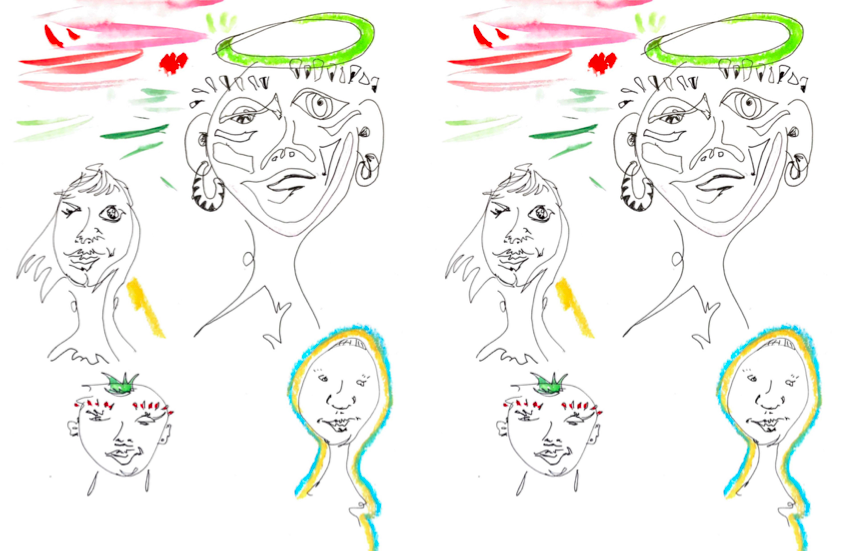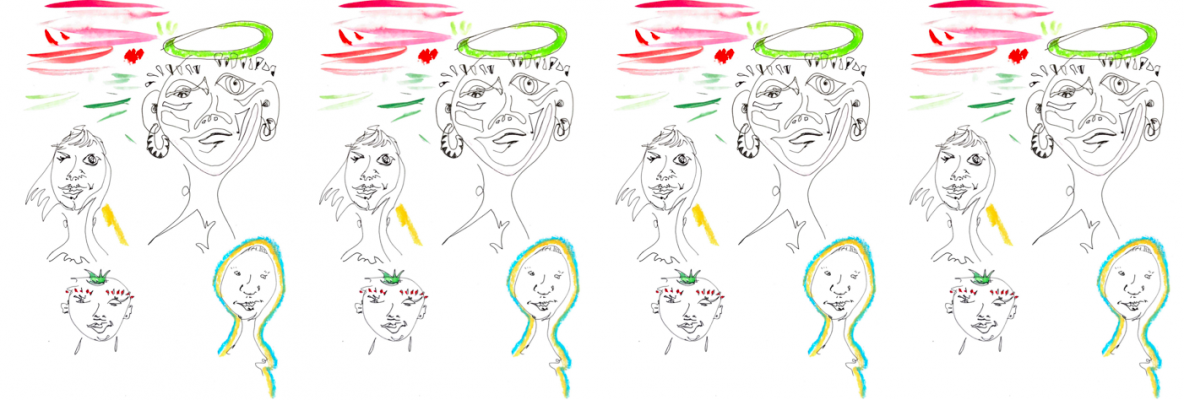WHY WE SHOULD LISTEN TO OTHER PEOPLE'S OPINIONS
By Lucy Moses / 22 November 2019

Illustration by Eimear McCourt
We form our views and opinions based on the news and information we read, watch and listen to. Facebook currently has 2.45 billion monthly users worldwide, indicating that social media is one of the most dominant ways people get their news these days. But algorithms determine what we see. Our content is filtered by ours and our peers clicks and searches. Our own online world becomes an echo chamber of codes and patterns determined by what we click on and consequently, we only ever see a sided view. Writer Tom Steinberg illustrated this, saying that he couldn’t see anybody on his timeline the day the UK decided to leave the EU but clearly there were out there somewhere – in another echo chamber he would never reach.
In the run-up the 2016 election, the Leave campaign used highly provocative propaganda. The ‘Breaking Point’ poster created by Nigel Farage in a UKIP campaign displays a long line of refugees who are of ethnic minority ‘queuing’ to enter the UK. This image was misleading and untrue. It is unreasonable, non-informative and presents a warped and negative picture of immigration. But if this is all you are seeing, this is all you can determine your own truth from. We have become a society which is far too assured by our own opinions and views, which are not challenged enough. It has taken three years for our politicians to break the Brexit deadlock through holding an election, and we are yet to see the result of this. It is only in unprecedented times like these where our MPs cannot reach reasonable and balanced decisions in a debating chamber – where the democratic and healthy debate should be happening.
This is why no plat-forming is also a dangerous game. A desire to prevent someone who spreads racist or homophobic messages speaking is understandable, but shutting it down and ignoring it allows it to fester and grow. Instead, we must understand that these opinions are coming from somewhere. We must listen and then challenge them. Ignoring those with differing points of view means that no progress can be made. It encourages us to become more convinced by and entrenched in our opinions. If we challenge others and encourage discussion and debate we can gain a genuine understanding of why someone else holds a different point of view or opinion to you.
In 2007 Özlem Cekic won a seat in the Danish Parliament. She was the first Muslim woman to do so.
Many of us view Özlem Cekic as an articulate, clever and open-minded woman and view her achievement as something to be celebrated...but many others won’t. Since her appointment, Cekic’s e-mail inbox has been full of racist hate mail. Her immediate reaction was to ignore these e-mails until one day, a college suggested that she ring one of her hate mail senders and ask if they go would meet up face to face with her. She discovered that she actually had lots in common with those she received abuse from.
Özlem Cekic
This of kind abuse is directed towards public figures online all the time. These online trolls completely abuse their right to free speech and incite hatefulness purposely for personal fulfilment. However, earlier in the year, for Anna Soubry, trolling took a serious and dangerous turn after she received death threats directly to her familial home. The high risk of these threats did not shake Soubry like the trolls would have hoped, instead, in an assertion of resistacne, she invited them for coffee. Cekic’s brave decision to meet her abusers demonstrates the power of face-to-face verbal conversation. She was surprised to find how much she had in common with those who had said such vile and violent things about her. She found that they were able to write strongly behind their phones or computer screens, voicing an opinion which seemingly felt right to them, yet when it was challenged, they realised it had no validity or weight behind it at all. The act of challenging someone else’s opinion in a non-confrontational way, without demonising them may allow us to find some common ground.
But of course, this simple sentiment of listening to, and not demonising others, of challenging and trying to find some form of common ground, relates to any situation in our lives. Cekic’s commendable act of speaking to her abusers, without jumping to conclusions or acting aggressively, shows how powerful a simple conversation and an open mind can be. We become more accepting of others and discover that we have more in common with those we may instinctively other or ignore, enabling us to grow and learn from each other, which is infinitely better than the alternative.
Art by
Words by
Share this article

